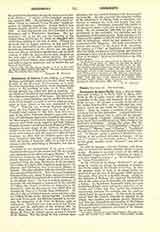

Desmarets de Saint-Sorlin, JEAN, a French dramatist and novelist, b. in Paris, 1595, d. there, 1676. Early in life he held various offices at court, was counsellor of the king, and secretary of the marine in the Levant. He became a member of the salon of the Hotel Rambouillet, and contributed the well-known verses on the violet for the “Guirlande de Julie”. Later he became a member of the French Academy and its first chancellor. Cardinal Richelieu, his protector, induced him to write for the theatre. His first tragedy, “Aspasie”, although a work of no great merit, had a brilliant success, 1636, owing to the cardinal’s protection. Among the plays that followed we may mention: “Les Visionnaires”, “Scipion”, “Roxane”, “Mirame”, and “L’ Europe“. The plots of the last two had evidently been inspired by the cardinal; “L’Europe” gives a picture of Richelieu’s conception of the political situation in Europe. Of his novel, “Arian”, La Fontaine declares that its plot is very good; another novel, “Roxane”, was left unfinished.
In 1645 he became a devout Christian, and there-after he devoted his literary abilities chiefly to pious works. He wrote a metrical version of the Office of the Blessed Virgin, and of the “Imitation of Christ“, and other religious poems, e.g. “Marie-Magdeleine” or “Grace Triomphante”.
In his “Clovis ou la France chretienne”, an epic poem in twenty-six cantos, he attempts to describe the Divine origin of the French monarchy. In this, his greatest work, in spite of its many faults, his patriotism and his love of old legends, which pervade the poem, often give it a peculiar charm. Owing to the criticism of Boileau, who opposed the introduction of the miraculous in literature, the poem proved a failure. In its defense Desmarets wrote an essay comparing French prose and poetry with that of the Greeks and Latins, and thus opened the celebrated controversy between the ancients and the moderns which lasted for many years. In this work he maintained that the French language is superior to all others, that modern can surpass ancient literature, and that the miraculous intervention of Providence is to be preferred to the machinery of the pagan poets. Desmarets was a consistent adversary of the Jansenists of Port-Royal. ches sur le theatre francais; PETIT DE JDLLEVILLE, La Litterature francaise (Paris, 1900); KERVILLER, J. Desmaretz (Paris, 1879).
FRANCIS L. ROUGIER

